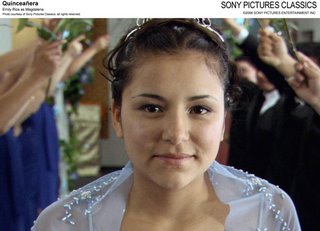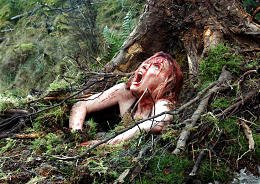Friday, August 04, 2006
The summer’s most audience friendly film is “Quinceañera”

Its core celebration, the fifteenth birthday of Magdelena (Emily Rios), the age when, in her culture’s eyes a young girl becomes a woman, is enough to make “Quinceañera,” the melting pot melodrama from writers/directors Richard Glatzer and Wash Westmoreland, into the most audience friendly film of the summer. But the filmmaker duo adds emotional heft to their heartfelt and often comic tale. Major change is occurring in Magdelena’s L.A. neighborhood as new residents are buying and renovating Echo Park homes. The gentrification is pushing out some members of Magdelena’s family. Any tale featuring Latino immigrants is timely but Glatzer and Westmoreland reach beyond the politics to focus on the human side of their travails.
“Quinceañera” offers a subplot for everyone: Latinos, working-class people, gays and the affluent. But instead of being a film of separate boxes, its story embraces everyone equally, and more importantly, lovingly.
Rios is a smiley firecracker as Magdelena, a cushy teen whose heart and mind is in the right place. Jesse Garcia, best known for his gritty performance on Cable TV’s “The Shield,” gives a standout performance as Magdelena’s ostracized cousin Carlos.
Their individual stories, and how they make amends with their family, celebrate Mexican culture. But its well-placed laughter and tears build a story that emphasizes what unites Americans as people who value homeland, their family and the freedom to be themselves.
“Quinceañera” made its world premiere at the 2006 Sundance Film Festival, where it won both the Dramatic Grand Jury Prize and the Dramatic Audience Award Sony Pictures Classics will release it in theaters major cities across America on August 4 and the rest of the country by the end of summer.
Scream Queens Fight Back in horrifying ‘The Descent’

Their screams feel real not so much because the script is high literature but more so because it’s what you would do in a similar situation. “The Descent,” the horrific new monster tale from British director Neil Marshall, made a cold January night at the Sundance Film Festival feel even colder the first time I watched it. Better yet, it turned a recent press screening on a sweltering July afternoon into a breeder of goose bumps. Marshall’s film, a clever twist on the Screaming Mimi stereotype, makes chills no matter where one watches it.
A group of athletic female friends (Shauna Macdonald, Natalie Mendoza, Saskia Mulder among others) reunite in the Appalachian Mountains for a cave expedition. The sperlunking trip is meant to invigorate damaged friendships, test their physical skills and discover a new cave. But fanged monsters await the women, who shriek and run like countless scream queens before them. Then, something fascinating happens. The woman stand tall, fight back and show the monsters that women with the right stuff can save themselves.
Marshall, creator of the cult favorite werewolf thriller Dog Soldiers, takes full advantage of the film’s creepy backdrop, the narrow passages far underground in an unmarked Appalachian cave. He fills the caves with the perfect beasties, a tribe of fanged, pasty-skinned man-beasts desperate to tear at the flesh of the women adventurers.
Still, what sets “The Descent” apart, what makes it one of the summer’s best surprises, is the way he twists his scream queens into rough and rugged heroines. Midway into “The Descent,” the women learn that if anyone is going to save them, they’re going to have to do it themselves. At that moment, “The Descent” evolves from a fun scream show to a scream show that’s fun and smart.
“The Descent” made its North American premiere at the 2006 Sundance Film Festival. Lions Gate Films will release it in theaters across America August 4.
Wednesday, August 02, 2006
First Person Flashback: Mike Leigh & Me

I had written my questions down in advance in order to be as thoughtful and informed as possible. But it wasn’t long into my interview with British filmmaker Mike Leigh that he stopped our conversation with a biting response.
“I don’t think you know what you’re talking about,” Leigh barked over the phone. He repeated himself for emphasis. “I know you don’t know what you’re talking about.”
My 1993 press interview on behalf of Leigh’s film “Naked” (pictured above) ended earlier than planned but I had already learned much that a beginning, twenty-something film journalist needs to know about his craft. The interviewer has to be confident of his skills and knowledge, that he’s worthy of sharing the table with filmmakers and artists and reviewing their work with authority.
Often, the interviewee's task is to knock the interviewer down to size. Here is journalism as a whirling dance of ego and humility, accomplishments and setbacks, pride and humiliation. It’s human life at its most dramatic, boosted by the art of film and the pizzazz of celebrity culture.
It’s worth noting that I met with Leigh three years later to interview him about his film “Secrets & Lies” and he was utterly charming (He apologized profusely for keeping me waiting).
I’ve enjoyed plenty of wonderful interviews since that early interview with Leigh, many of them moving beyond the realm of journalism and becoming something friendly. Of course, more blow-ups landed at my feet as I wrote profiles and covered film and culture for various newspapers. But I was never rattled, never unsure of my thoughts or words. I have Leigh to thank for my confidence. Long ago, he tested me with fire.